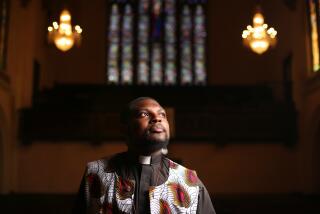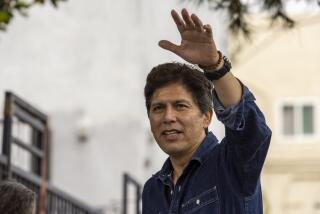Ed Edelman returns to the spotlight in a PBS documentary
Mari Edelman called upstairs to the caretaker, asking if her husband was awake and in good enough shape to handle a visitor.
As we ascended the stairs of their Westwood home, Mari explained that her husband’s cruel condition — an advancing neurological disease — has left him sharp mentally but withered physically, and barely able to speak.
Edmund D. Edelman, who put in 29 years as an elected official in Los Angeles, first as a City Councilman and then as a member of the county Board of Supervisors, lay on his back against a window, a blanket draped over him. He squeezed out an acknowledgment, barely audible, and I sat down to talk to him, with Mari doing her best to interpret his responses.
The occasion for my visit was a documentary that will air Thursday night at 7 on KOCE’s PBS SoCal. “The Passions and Politics of Ed Edelman” is a love letter, written, directed and produced over a four-year span by Mari, a clinical psychologist who had scant film experience before this undertaking. The documentary is narrated by Tom Brokaw and features a who’s who of local pundits, professors and politicians, as well as former Edelman staffers.
“There are hundreds of thousands of people in Los Angeles County, and in this state, whose lives are better because of someone whose name they never knew,” former Edelman aide John Lovell says in the documentary.
That’s one of the reasons she wanted to make the film, Mari said. If Edelman, now 82, is unknown to many, it’s partly because he left office 19 years ago and wasn’t one to mug for TV cameras even when he was in the game. Given the carnival act that politics can be today, Mari wanted the world to know about a man whose geniality and decency were noted even by his political foes.
“When you’re talking about Ed’s integrity, and his willingness to stand by his word, he was very reliable on that score, unlike a couple of my other colleagues,” former L.A. County Supervisor Peter Schabarum says in the documentary.
Schabarum was a pillar in the conservative foundation of local politics, which ruled both county and city government when the liberal Edelman crashed the party in 1965 by winning a City Council seat. City Hall resembled a clubhouse at the time, with pols all too often carrying water for the local business elite, and many in the establishment weren’t thrilled about having to put up with a UCLA-trained, JFK-loving lawyer and Westside Jew who believed government existed to do good things for the least fortunate.
Edelman was among the first elected officials to stand, unabashedly, for gay rights.
When police pounded war protesters, he waved a stick at police abuse.
He denounced censorship and defended artistic expression, even the risque.
He warned that Prop. 13 would wreak havoc on local governments and benefit commercial property owners more than homeowners.
When others wrote off the homeless as bums, Edelman observed that many of them were mentally ill, and he argued that helping them was both humane and cost-effective.
The county children’s court is named for him because he believed child abuse and neglect — and juvenile justice — needed to be handled in “child-sensitive” quarters apart from the adult facilities.
He was an accomplished cellist who helped clear the way for Walt Disney Concert Hall, dug up funding to keep the Hollywood Bowl in business and insisted that the Bowl continue to reserve some $1 tickets for Bowl events so everyone can afford to hear great live music, a tradition that survives today.
And, to name just one more achievement, Edelman dramatically brokered a deal to snatch more than 600 acres of a Topanga hillside from the clutches of developers and preserve the area as public parkland.
It’s not a bad record of leadership based entirely on principle rather than polling, on conviction rather than calculation. And in the midst of a mayoral election, as we are, what better time to be reminded of an era when politics could be the realm of someone whose primary motive was public service.
As UCLA professor and former presidential candidate Michael Dukakis says in the documentary, if his students asked to meet a public servant whose qualities Dukakis most admires, “The person I’d send them to would be Ed.”
No one emerges unscathed, though, from politics. Edelman’s critics on the right had their natural grievances, and on the left, Edelman took shots from those who wanted a man on fire, bellowing through a bullhorn rather than negotiating quietly with the enemy, behind doors that were sometimes closed to the media. The biggest knock against Edelman involves a reapportionment battle in which Latino activists felt he was more interested in saving his political career than agreeing to a realignment plan that might have helped a Latino candidate unseat him.
The truth was a little more complicated than that, said Jaime Regalado, former director of Cal State L.A’s Pat Brown Institute of Public Affairs. Regalado agreed with some of the criticism of Edelman on the redrawing of district boundaries, but says he also understood the reluctance to sacrifice the seat of a man who’d been a reliable advocate for so many years.
Today, almost 20 years after leaving public office, Edelman’s only regret seems to be that he can’t do it all over again.
“I loved it,” he said, repeating himself in case I didn’t understand the first time. “I love my wife,” he added, and Mari placed her hand on his.
They met 45 years ago this week on a blind date, and each fell in love within the first hour, say the Edelmans, who have two daughters and four grandchildren.
Mari’s documentary ends with these words, spoken by her husband:
“Don’t give up hope. Keep striving. Keep trying to improve yourself and your community. We need people that care for one another.”
More to Read
Start your day right
Sign up for Essential California for news, features and recommendations from the L.A. Times and beyond in your inbox six days a week.
You may occasionally receive promotional content from the Los Angeles Times.







